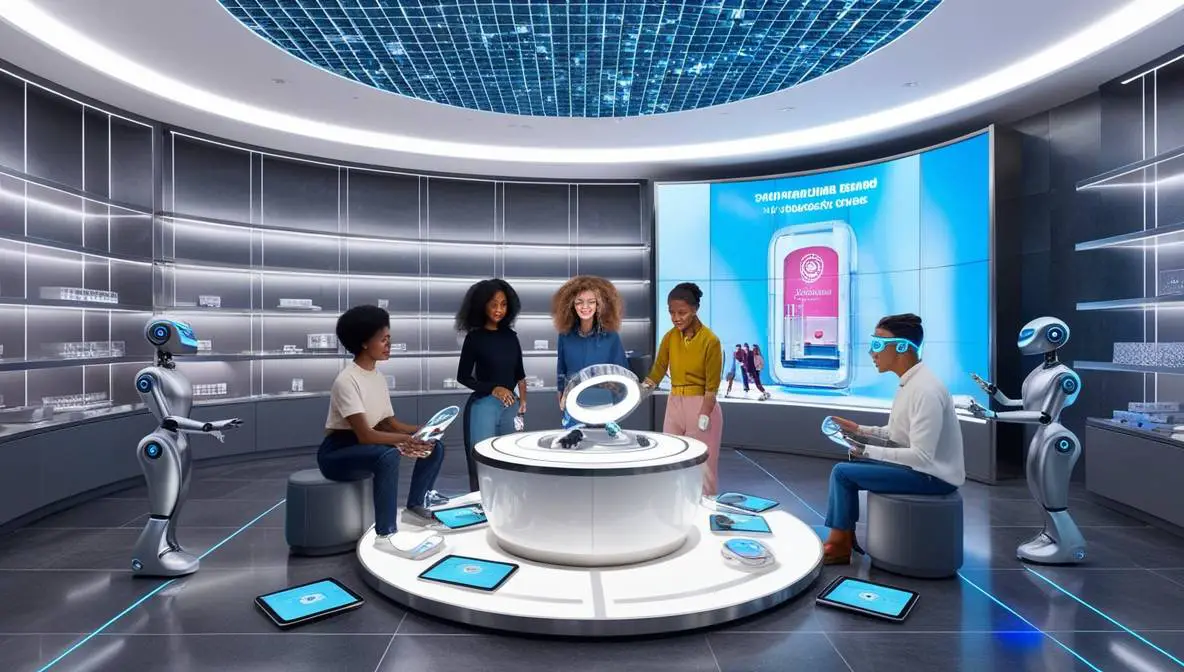The retail landscape has always been dynamic, but in 2025, groundbreaking retail technology is revolutionizing the industry. From AI-driven analytics to cashierless stores, these innovations are reshaping how businesses operate and how customers shop.
This article dives into the most talked-about retail technologies, how they work, and their impact on the future of retail.

The Rise of Artificial Intelligence in Retail
Artificial Intelligence (AI) has become a cornerstone of modern retail strategies. Retailers are leveraging AI to analyze customer behavior, predict trends, and optimize inventory management.
Key Applications of AI:
| Application | Benefits |
|---|---|
| Personalized Marketing | Tailored promotions increase customer engagement and drive sales. |
| Predictive Analytics | Helps forecast demand, reducing overstock or understock issues. |
| Chatbots and Virtual Assistants | Enhance customer service with 24/7 support. |
External Resource: Explore how IBM AI for Retail drives innovation.
Cashierless Stores: A Seamless Shopping Experience
Amazon Go pioneered the concept of cashierless stores, and now competitors are following suit. These stores use computer vision, weight sensors, and advanced algorithms to enable customers to shop without traditional checkouts.
Benefits of Cashierless Stores:
- Convenience: Faster checkout times.
- Efficiency: Reduces staffing costs.
- Accuracy: Minimizes human error in transactions.
Discover more about Amazon Go’s technology.
Augmented Reality (AR) Enhancing the Shopping Experience
Augmented Reality (AR) is transforming the way customers interact with products online and in-store. AR allows users to visualize products in their environment or try them virtually before purchase.
Popular AR Retail Applications:
| Use Case | Example |
| Virtual Fitting Rooms | Try clothing or accessories virtually to ensure the perfect fit. |
| Home Decor Visualization | See how furniture or decor items look in your space. |
| Interactive Product Displays | Engage customers with immersive, 3D product views. |
External Resource: Learn how IKEA Place leverages AR.
The Internet of Things (IoT) in Retail
IoT devices are streamlining operations and improving customer experiences in retail environments. Smart shelves, connected devices, and real-time data analytics offer unparalleled advantages.
IoT Applications:
- Smart Shelves: Automatically track inventory levels and reduce stockouts.
- Beacons: Send personalized offers to customers’ smartphones based on their location in-store.
- Connected Devices: Enhance supply chain efficiency with real-time tracking.
External Resource: Read about IoT solutions for retail.
Sustainability Through Technology
Sustainability is more than a trend—it’s a necessity. Technology is helping retailers adopt eco-friendly practices while enhancing efficiency.
Green Retail Tech:
| Technology | Environmental Impact |
| Energy-Efficient Systems | Lower energy consumption reduces carbon footprints. |
| Digital Receipts | Reduces paper waste and enhances convenience. |
| Sustainable Supply Chains | IoT and blockchain ensure ethical sourcing and minimal waste. |
External Resource: Discover Green Retail Innovation.
Blockchain: Enhancing Transparency and Trust
Blockchain technology ensures transparency in supply chains by recording transactions in an immutable ledger. This innovation helps retailers maintain ethical practices and build consumer trust.
Blockchain Benefits:
- Ensures authenticity of products.
- Streamlines payment processes.
- Reduces fraud.
External Resource: Learn more about blockchain in retail.
The Role of Data Analytics
Data analytics provides retailers with actionable insights. By analyzing customer behavior, preferences, and market trends, businesses can make informed decisions to enhance operations.
Examples of Data Analytics in Action:
- Identifying top-performing products.
- Understanding customer purchasing patterns.
- Optimizing pricing strategies.
External Resource: Explore Google Analytics for Retail.
Conclusion
The retail industry is undergoing a technology-driven transformation in 2025. From AI to AR, IoT, and blockchain, these innovations are reshaping customer experiences and operational efficiencies. Retailers that embrace these advancements are better positioned to thrive in an ever-evolving market.
Stay ahead of the curve by exploring these technologies and integrating them into your strategy. For more insights, visit trusted sources like Retail Dive or Forbes Retail.
